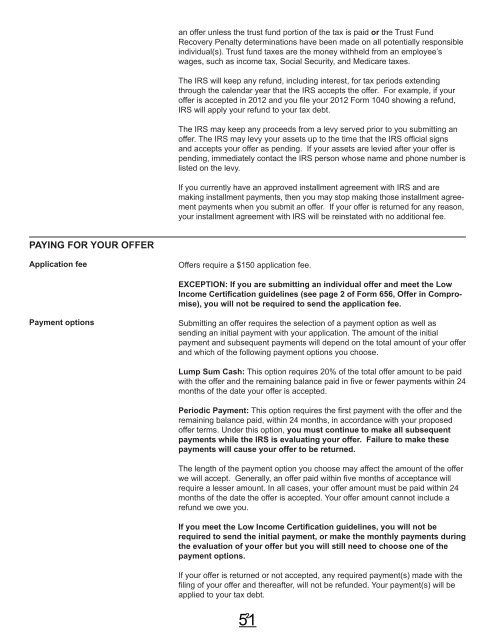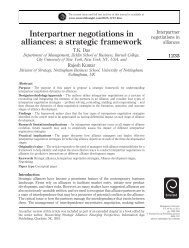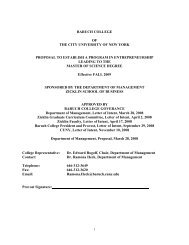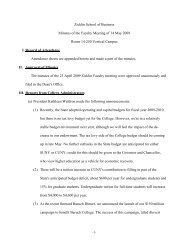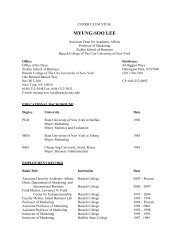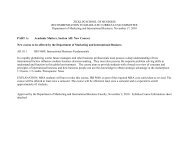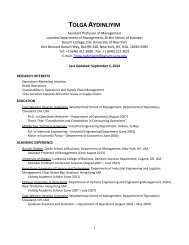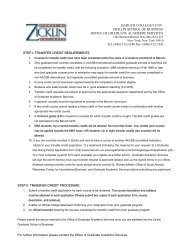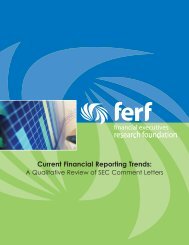Tax Seminar #3 – December 3 2012
Workbook - Zicklin School of Business
Workbook - Zicklin School of Business
You also want an ePaper? Increase the reach of your titles
YUMPU automatically turns print PDFs into web optimized ePapers that Google loves.
an offer unless the trust fund portion of the tax is paid or the Trust Fund<br />
Recovery Penalty determinations have been made on all potentially responsible<br />
individual(s). Trust fund taxes are the money withheld from an employee’s<br />
wages, such as income tax, Social Security, and Medicare taxes.<br />
The IRS will keep any refund, including interest, for tax periods extending<br />
through the calendar year that the IRS accepts the offer. For example, if your<br />
offer is accepted in <strong>2012</strong> and you file your <strong>2012</strong> Form 1040 showing a refund,<br />
IRS will apply your refund to your tax debt.<br />
The IRS may keep any proceeds from a levy served prior to you submitting an<br />
offer. The IRS may levy your assets up to the time that the IRS official signs<br />
and accepts your offer as pending. If your assets are levied after your offer is<br />
pending, immediately contact the IRS person whose name and phone number is<br />
listed on the levy.<br />
If you currently have an approved installment agreement with IRS and are<br />
making installment payments, then you may stop making those installment agreement<br />
payments when you submit an offer. If your offer is returned for any reason,<br />
your installment agreement with IRS will be reinstated with no additional fee.<br />
PAYING FOR YOUR OFFER<br />
Application fee<br />
Offers require a $150 application fee.<br />
EXCEPTION: If you are submitting an individual offer and meet the Low<br />
Income Certification guidelines (see page 2 of Form 656, Offer in Compromise),<br />
you will not be required to send the application fee.<br />
Payment options<br />
Submitting an offer requires the selection of a payment option as well as<br />
sending an initial payment with your application. The amount of the initial<br />
payment and subsequent payments will depend on the total amount of your offer<br />
and which of the following payment options you choose.<br />
Lump Sum Cash: This option requires 20% of the total offer amount to be paid<br />
with the offer and the remaining balance paid in five or fewer payments within 24<br />
months of the date your offer is accepted.<br />
Periodic Payment: This option requires the first payment with the offer and the<br />
remaining balance paid, within 24 months, in accordance with your proposed<br />
offer terms. Under this option, you must continue to make all subsequent<br />
payments while the IRS is evaluating your offer. Failure to make these<br />
payments will cause your offer to be returned.<br />
The length of the payment option you choose may affect the amount of the offer<br />
we will accept. Generally, an offer paid within five months of acceptance will<br />
require a lesser amount. In all cases, your offer amount must be paid within 24<br />
months of the date the offer is accepted. Your offer amount cannot include a<br />
refund we owe you.<br />
If you meet the Low Income Certification guidelines, you will not be<br />
required to send the initial payment, or make the monthly payments during<br />
the evaluation of your offer but you will still need to choose one of the<br />
payment options.<br />
If your offer is returned or not accepted, any required payment(s) made with the<br />
filing of your offer and thereafter, will not be refunded. Your payment(s) will be<br />
applied to your tax debt.<br />
2<br />
51


